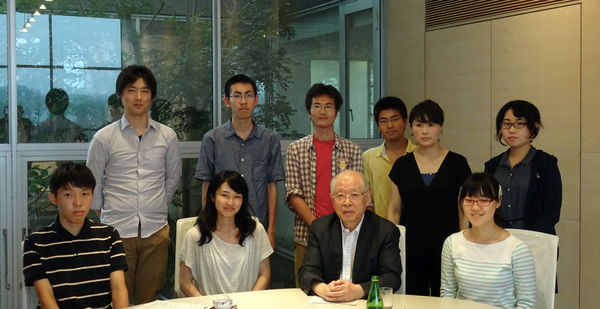Since January 2013, University Prof. Ryoji Noyori, a Nobel Laureate in Chemistry (2001), has contributed numerous articles to "Kamitsubute" in Chunichi Shimbun. Based on these articles, he holds regular academic discussions with students at Nagoya University. At the Sixteenth Noyori Academy Salon, held on July 8, 2015, Prof. Noyori and six students from different academic fields at Nagoya University discussed the topic "Globalization and Internationalization." Explaining the difference between globalization and internationalization in "Kamitsubute," Prof. Noyori claimed that the important element for accomplishing international research is cooperation with each other while respecting the values of diverse cultures.

Respecting Each Other’s Values is Necessary for Success in International Research
Masanori Kurino, a freshman at the School of Letters
What do you think about the development of global human resources?
Prof. Noyori
Globalization will unite the world, which is a static trend. To maintain national capability, it is necessary to take advantage of globalization. On the other hand, internationalization implies mutual cooperation despite each nation’s interdisciplinarity based on its own culture. In the borderless field of natural sciences, Japan is strongly required to globalize, while preserving its tradition and originality is also significant. For international collaboration, we must admire our neighbors’ values. You will be required to possess the skills for collaborative work as well as a competitive edge.
Takeru Kumabe, a freshman at the School of Engineering
It is my understanding that researchers face the challenge of intensive study in the highly competitive research field.
Prof. Noyori
The academic world is not always competitive. An example is CERN, the European Organization for Nuclear Research, which consists of international joint research laboratories. Second, over 50 % of academic articles published in the world are a result of international research collaboration; however, Japan accounts for only a small proportion of this collaboration. Before competing with each other, I strongly recommend that you attempt collaborative work because it is necessary to first develop science and technology and competent products.
Battsengel Tsogzolmaa, a third-year PhD student at the Graduate School of Information Science
What is the role of our native languages in internationalization?
Prof. Noyori
It would be a pity if through globalization we lost ethnic cultures or if powerful countries like the United States and China standardize values and languages. We should admire the cultural diversity. Reflecting on our history of development, I would like you to decide upon your future steps.
Kana Hisabayashi, a freshman at the School of Science
Interdisciplinarity has been applied within education. I am wondering how wide we should study by crossing boundaries.
Prof. Noyori
Nature is originally a single unit; however, it has been artificially atomized, which has caused enormous challenges. For instance, academic disciplines, such as physics, chemistry, and biology, are divided into faculty level or even school level at the university. This is recognized to be a worldwide problem. Thus, for the development of interdisciplinary research, future reforms are necessary.
Ruka Sumida, a freshman at the School of Science
What in attitude is different between Japanese and foreign researchers?
Prof. Noyori
Japanese researchers are safety-oriented. In the United States, society is more challenge-oriented, and they seem to enjoy this aspect of life. When I was young, Japan established a hierarchical system in society. Now, however, we have to restructure this decrepit system into something more challenging. This might be difficult owing to the accepted convention of majority rule; however, it is important to possess an independent and brave mind.
Manami Kobayashi, a first-year student at the Graduate School of International Development
I believe that we need to develop our English aptitude for pertinent discussions.
Prof. Noyori
Currently, over 90 % of the communication in the field of science and technology occurs in English. However, English ability does not necessarily correspond to our research ability. Writing articles in English and discussing in English are necessary; however, before that, developing a proficiency in your mother tongue is significant. After all, languages are human creations. I believe that first, Japanese people should humbly and seriously improve their native tongue.
Original article published in Chunichi Shimbun on July 9, 2015.